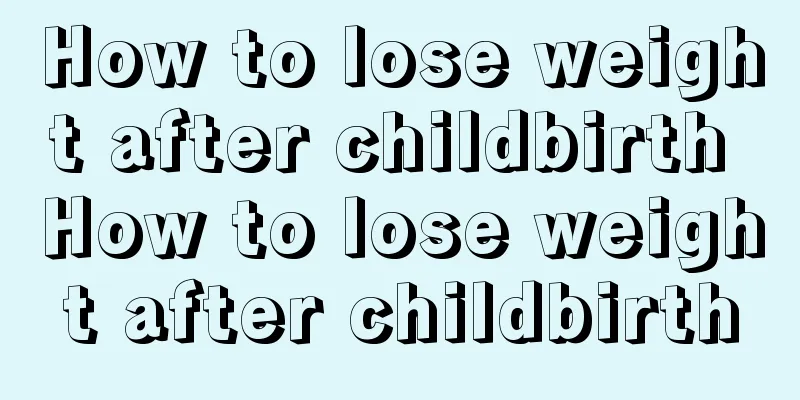How long does it take for a baby to be weaned off milk? ...

|
As the baby grows, there will be a period of milk aversion. Parents who have milk aversion symptoms do not need to worry, these are normal in the baby's growth process. Let's see how parents should deal with milk aversion. How to deal with milk aversion symptoms1. Mothers should pay attention to not having too high a psychological requirement and accept that the amount of feeding for each child will vary. Stop feeding when the child stops eating. Do not try to find ways to feed the child a fixed amount in multiple times, or compare the amount of feeding with other children. 2. Many mothers of babies who are weaned from milk will feed their babies casually, waiting until their babies need it, because even if their babies are weaned from milk, they cannot resist being hungry. When feeding, mothers no longer need to feed their babies at regular times, and can use small and frequent meals. Usually, use games to consume the baby's physical strength, such as indoor swimming, playing on fitness racks, etc. When his energy is exhausted, he will feel hungry, and his eating condition will improve a lot. 3. Some mothers were too anxious because their babies didn’t eat milk all day and beat their babies. They also kept shouting at the babies: “What do you want to do!” The babies were unhappy all night, cried when they heard their mothers talking loudly, and were frightened awake twice. Later, they found out that it was because the baby had bloating and farted a lot, and then returned to the normal feeding state. The mother regretted it very much. 4. No matter what the reason is for the baby's aversion to milk, if you want to correct it, you have to rely on the baby to restore his hunger. It is important to create a good life order for the baby. The baby will also form a fixed biological clock when to feed. If he is willing to eat every 4 hours, he will definitely not be happy to accept it if you feed him every 2 hours. Too frequent feeding will make the baby resist. And you must not tease the baby when eating, because the baby at this stage is very curious about the outside world. If there is something else around him that attracts his attention when he is eating, he will naturally not like to eat. What is the milk withdrawal period?1. It mainly refers to the phenomenon that the baby suddenly decreases the amount of milk he drinks or drinks more or less milk erratically when he is 4 to 6 months old. Milk aversion is not a situation that babies will inevitably encounter during their growth and development, but it may happen to some babies. However, more and more babies are becoming averse to milk recently. 2. "Milk aversion" is not a medical disease. Generally speaking, babies' "milk aversion" can be divided into "physiological" milk aversion and "pathological" milk aversion. 3. Pathological milk aversion: At this time, in addition to "milk aversion", the baby will also show other corresponding abnormal behaviors, such as: restless sleep; poor spirit; easy crying; vomiting and other disease manifestations. This is a pathological milk aversion period and needs medical treatment. 4. Physiological milk aversion: refers to the sudden decrease or erratic change in baby's appetite when maintaining a normal or basically normal daily routine. The baby's appetite will be restored after a period of time. 5. When the baby is 3-4 months old, he gradually matures. On the one hand, he may add complementary food and prefer new flavors of food, and temporarily lose interest in milk powder. At 4-6 months, the lactose enzyme in the baby's body begins to decrease, the taste of the tongue begins to change, and the appetite begins to change. On the other hand, his hearing and vision have made breakthrough progress, making him more interested in the outside world. He often "meddles in other people's business" at the slightest sign of trouble, and his mind is no longer on feeding. 6. When the baby is about 6-10 months old, most babies are growing teeth. Due to the itchy gums, babies often focus on biting the nipple when feeding, leading to milk aversion symptoms. How long will the weaning period last?When babies are four or five months old, they are no longer as focused on breastfeeding as they were in the first three months. Instead, they eat on and off, and can easily stop breastfeeding due to external interference. This period is called the milk aversion period. During the period of milk aversion, babies will eat larger or smaller meals due to different factors. As long as the baby's growth curve is within a reasonable range, he is in good spirits and has no uncomfortable symptoms, do not force him to eat! Reduce external stimulation when feeding. If there are people walking around or noisy sounds, it is easy to distract the baby's attention and reduce his appetite. Therefore, it is very important to provide the child with a quiet eating environment. The milk aversion period is also the time when babies tell their parents that it is time to add complementary foods. If you are worried about complementary food allergies and encounter milk aversion, you can start with low-allergenic foods such as baby rice cereal, and wait until the baby adapts well, then try other low-allergenic foods. When adding complementary foods, the principle is to add one at a time, and start with a small amount, and take a gradual approach to observe whether the baby can adapt, and then slowly increase the amount and variety. How long a baby's milk aversion period lasts varies from baby to baby, ranging from 1 to 2 weeks to half a year. When babies are 4 to 6 months old, they start to drink less milk and have a poor appetite. This is a common phenomenon of "milk aversion" in babies. Its characteristics are that the baby develops normally and is very energetic, but the milk supply is temporarily reduced. Usually, the appetite will recover naturally in about a month. When the baby is 4 to 6 months old, his curiosity grows day by day. Because the muscle tension of the neck is good, he begins to feel novel about the things around him, which will also distract him from eating. This is a common period of milk aversion. The reaction of spitting out when the tongue touches something will also disappear. If there is no proper addition of complementary food, and feeding with a small spoon to train the baby's oral coordination function, the baby may only drink milk and not want to eat solid food in the future, and will show obvious anorexia and unbalanced nutrition. Mothers who breastfeed should never stop breastfeeding when their babies become averse to milk. As long as soft liquid complementary food is provided at the same time, breastfeeding can be fed until the age of 2. |
<<: The correct way to mix feeding How to feed your baby properly
>>: How to train your baby's grasping ability when he can't grasp things
Recommend
Can babies wear open-crotch pants in summer? Are there any harms for babies wearing open-crotch pants?
Summer is here, and many people like to change th...
What are the symptoms of rare forms of arthritis in children? How is arthritis in children diagnosed?
Arthritis usually occurs in middle-aged and elder...
Are pears cold or warm in nature? Do pears increase or decrease internal heat?
Pears are a very common fruit on the market. Pear...
Can babies use electric fans? At what age can babies use electric fans?
Electric fans are a must-have for cooling off in ...
At what age is it better for babies to drink milk powder? Why do babies not drink milk powder?
My baby is already over one year old. Is it time ...
Can a two-year-old baby watch TV? What should a two-year-old baby pay attention to when watching TV?
Two-year-old babies can already begin to speak a ...
Can taking calcium tablets help you have a boy? Can taking calcium tablets help you have a son?
I have been preparing for pregnancy for the past ...
How do women get through the grief period after failed pregnancy?
Some sisters don’t know how to face it after the ...
Is it normal for a 3 month old baby to sleep more than 10 hours a day?
My husband has been getting up at night to feed o...
Can pregnant women eat sesame oil? What are the benefits of eating sesame oil during pregnancy?
Pregnant women can eat sesame oil, and the nutrie...
What should I do if my baby has a sore throat? What should I eat to cure my baby's sore throat quickly?
Babies are not fully developed in all aspects, so...
What is artificial insemination? How much does it cost?
Artificial insemination is a medical technology t...
How should I take care of myself during pregnancy? How should I take care of myself during pregnancy according to my physical condition?
Once a woman is pregnant, she needs to take in mo...
Can pregnant women use Dettol disinfectant? Is Dettol disinfectant effective against fungi?
Dettol disinfectant can be used to disinfect woun...
How to protect infants' throats? Seven tips to protect throats
Children's throats are very fragile and need ...









